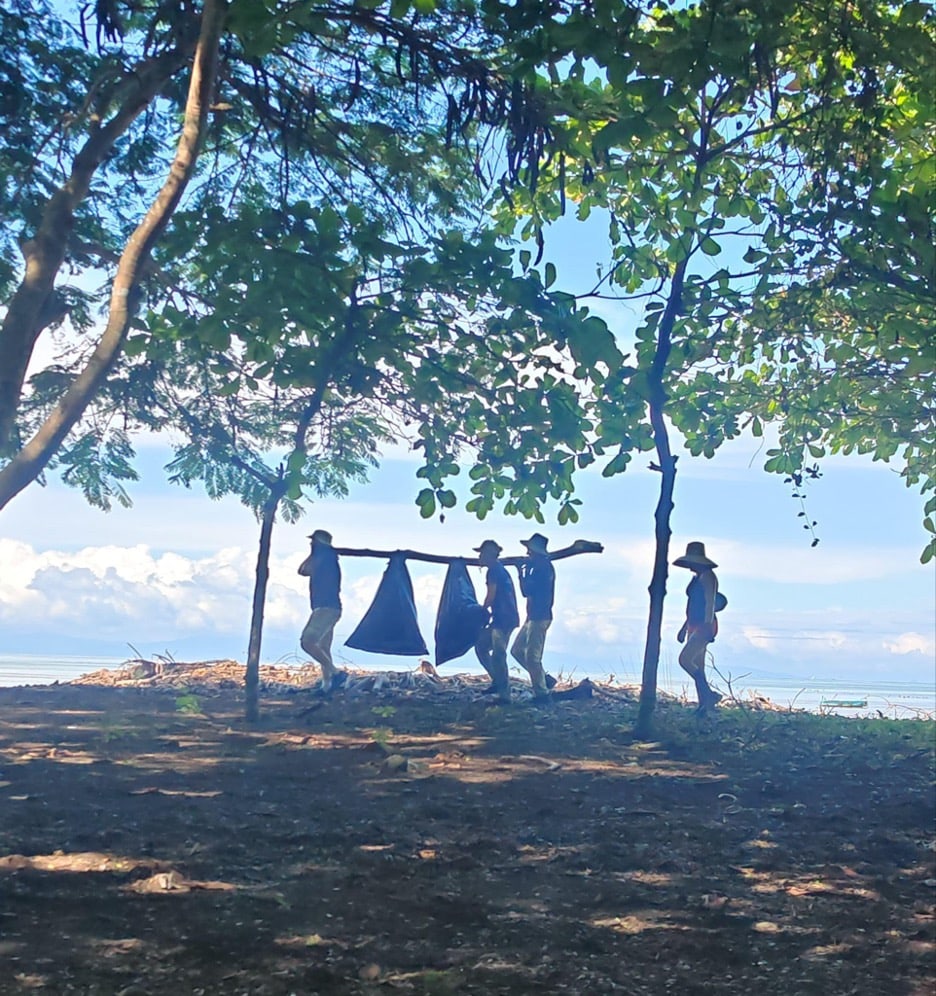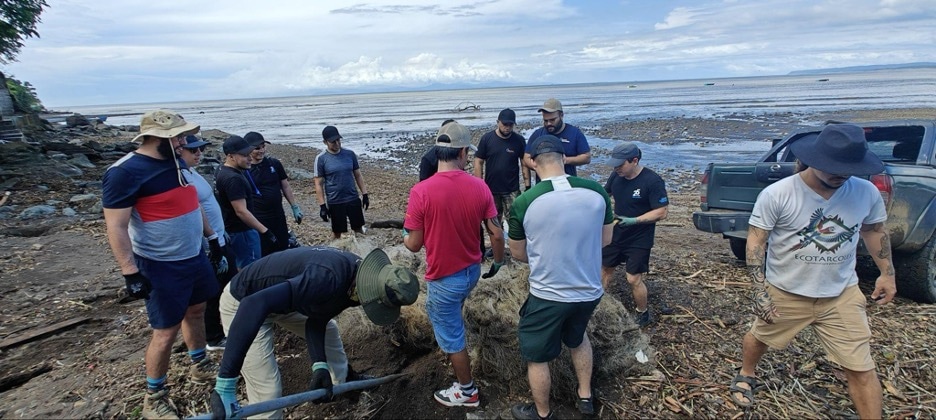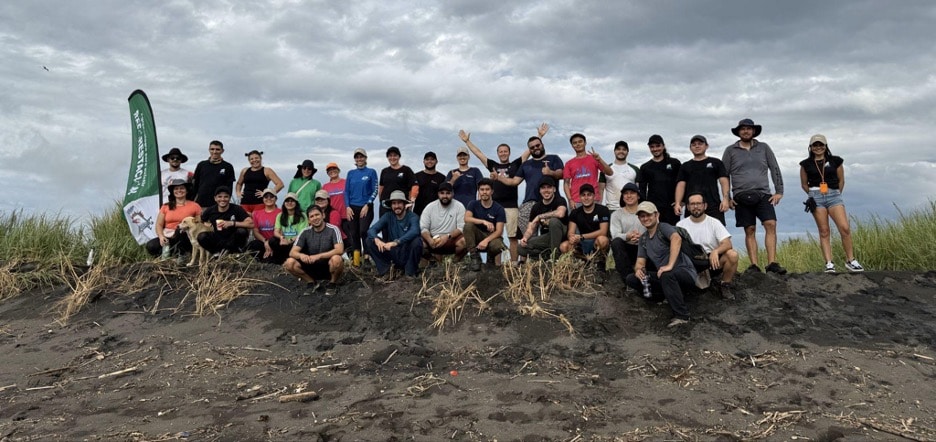Making an Impact: Beach Cleanup and Reforestation Event
On November 22, 2024, the Costa Rica Sustainability Pillar organized a transformative beach clean-up and reforestation event. This effort, which brought together 31 passionate volunteers, was not just about removing trash and planting trees; it was about confronting unseen problems that have far-reaching consequences.
Removing a literal ton of waste from the beach
Our day began early, with a bus departing from the office at 6 AM. After a quick breakfast at the vendor’s facilities, we headed to Playa Tárcoles, a beach not frequented by tourists and known for its heavy pollution. The lack of tourists at this beach means its challenges often go unnoticed, which allows the pollution to persist.
This highlights a critical issue: an unseen problem is a big problem. When people are unaware of the damage they’re creating, they continue their habits without making necessary changes. However, addressing these habits — by reducing consumption, engaging in proper waste disposal, and making more mindful decisions — is exactly what’s needed to create real change.
At the beach, we collected nearly a ton of waste, and the variety of trash we found painted a sobering picture of pollution. We gathered:
- Plastics of every size, from microplastics that are consumed by fish and eventually make their way into our own food, and larger plastic items that can strangle marine animals like turtles and other fish
- Aluminum cans, glass bottles, and Styrofoam, all of which take decades — or even centuries — to decompose
 Akamai volunteers collected and properly disposed of nearly a ton of waste at the beach
Akamai volunteers collected and properly disposed of nearly a ton of waste at the beach
Tangles, trucks, and teamwork
One of the most challenging tasks we had was to remove fishing nets that were tangled and buried deep in the sand. These nets were so massive and heavy that we required a pickup truck to transport them, and even then, the team had to collaborate intensively to manage the task. This moment of teamwork illustrated the power of collective action and problem-solving.
All the discarded items tell a story of how everyday choices impact the environment. It’s a reminder that the lifecycle of an item doesn’t end when we throw it away; it travels, accumulates, and can create long-term harm for ecosystems, wildlife, and even human health.
 Massive fishing nets had to be unburied and carted away by a truck
Massive fishing nets had to be unburied and carted away by a truck
Discussing food and greenhouse gas emissions
After the clean-up, we returned to the vendor’s facilities for a vegetarian lunch and a thought-provoking discussion about the impact of the meat industry on our planet. The invited speaker highlighted how livestock farming contributes significantly to greenhouse gas emissions and water consumption. By serving a vegetarian meal, we ensured the day’s impact wasn’t negated by the resources needed to produce meat.
We also learned about the true lungs of the planet — plankton and phytoplankton, which produce most of the oxygen we breathe. Protecting marine ecosystems is vital not only for aquatic life but also for the survival of these critical organisms that sustain our atmosphere.
Maximizing our impact by planting trees
In the afternoon, we moved on to Playa Azul for our reforestation effort and planted 120 endemic trees. These species were chosen specifically for their ability to thrive in the local environment and to contribute to the preservation of Costa Rica’s biodiversity.
Planting endemic trees is critical because it ensures that the flora integrates seamlessly into the existing ecosystem by providing food and shelter for native animals.
We also implemented Hidrokeeper, a product designed to retain water for extended periods during the dry season, which gives the young trees a better chance at survival. These trees will play an essential role in the years to come.
- They will provide shade, helping reduce temperatures in the area.
- They will offer habitats for birds and other wildlife and support the local ecosystem.
- They will contribute to cleaner air by absorbing carbon dioxide and releasing oxygen.
A meaningful impact on the environment
Even as fatigue set in after a long day of hard work, the team’s spirit and commitment never wavered. The volunteers came together to create a meaningful, lasting change — not just for the environment but also for their own understanding of sustainability.
 Akamai volunteers had a meaningful impact on the environment in Costa Rica
Akamai volunteers had a meaningful impact on the environment in Costa Rica
What can you do to make a difference in sustainability?
We all have the power to contribute to a more sustainable world. You can start with simple steps, such as:
- Reduce plastic use: Choose reusable bottles, bags, and containers to minimize waste
- Dispose of trash properly: Ensure your waste is recycled or composted whenever possible to prevent it from polluting natural environments
- Join a cleanup event: Participate in or organize local efforts to clean up beaches, parks, or other areas in need
- Plant trees: Consider planting native species in your area to support local ecosystems and combat climate change
- Be mindful of consumption: Make small changes, like reducing meat consumption and using sustainable products, to reduce your ecological footprint
Every small action adds up. Together, we can tackle unseen problems and protect our planet for future generations. Let’s turn awareness into action and build a more sustainable future — one choice at a time.


